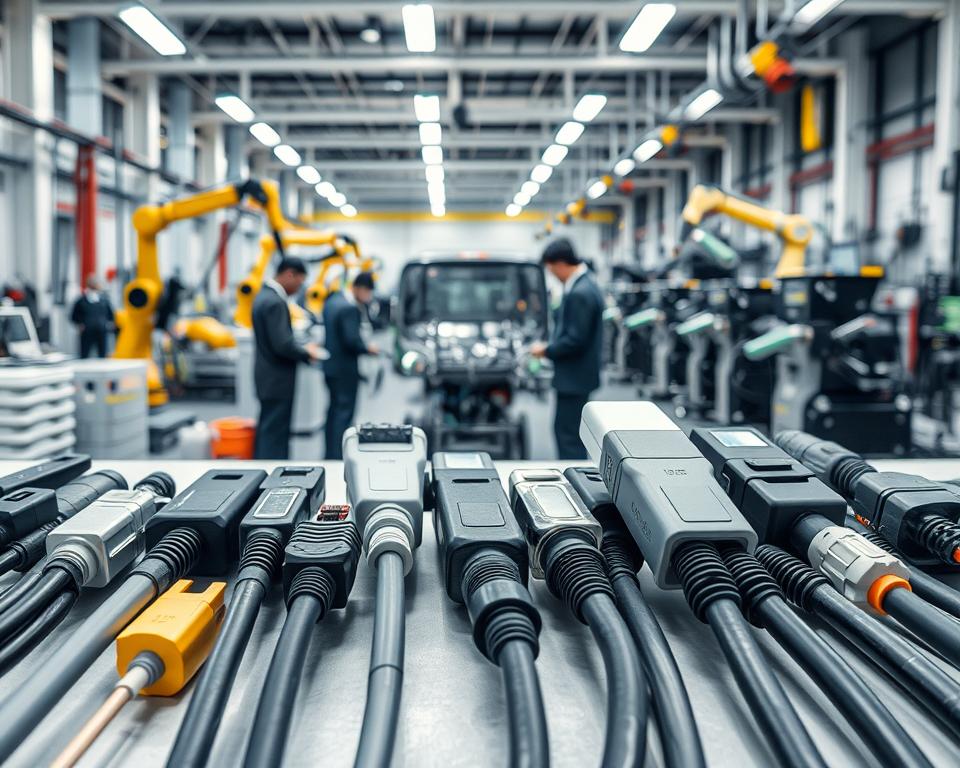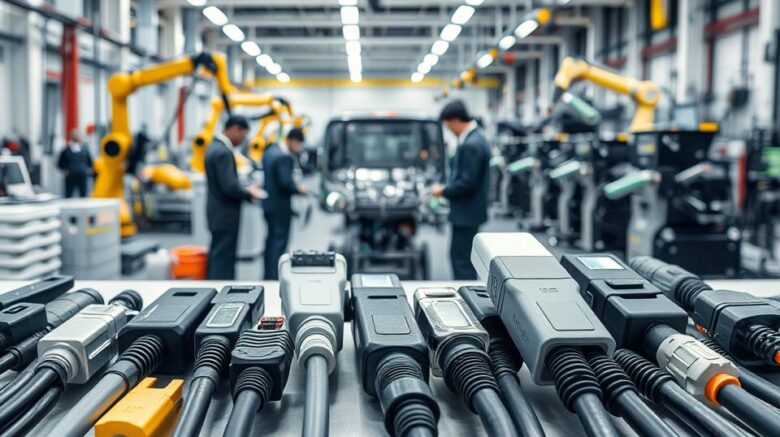Premier EV Charging Cable Manufacturers for Your Electric Vehicle
The EV market is expanding rapidly, with the demand for trustworthy and fast charging solutions growing exponentially. Currently, top brands have been at the vanguard of this change, providing top-tier charging infrastructure. Southwire, for instance, entered the market in 2014 and excels, boasting over 1000 five-star reviews and 75 years of experience in the electrical construction industry.
The surge in electric vehicle adoption necessitates the need for long-lasting, rapid, and secure EV Charger Manufacturers. Key suppliers are developing to address changing requirements, offering products that boost the overall charging experience.
Grasping the distinctions between various charging solutions is crucial for making informed decisions. High-grade charging infrastructure has a direct effect on vehicle performance and customer satisfaction.
Core Lessons
- Key suppliers deliver top-tier cables enhancing lifespan and protection.
- EV market expansion drives need for high-efficiency chargers.
- Leading companies innovate to meet the evolving needs of electric vehicle owners.
- Premium cables enhance both charge rate and vehicle function.
- Opting for top-tier cables yields future savings.

Why High-Quality EV Cables Matter
As more drivers choose EVs, the significance of premium EV charging cables cannot be overstated. The efficiency, security, and dependability of electric vehicle charging systems hinge upon the quality of the charging cables used.
Advancements in EV Charging
Electric vehicle charging technology has undergone significant advancements in recent years, with a focus on speedy charge times and enhanced protections. Modern EV charging cables are built for these requirements, featuring high-grade materials and advanced designs to minimize energy waste and maximize charging efficiency.
Why Quality Matters in EV Charging Infrastructure
High-grade cables ensure reliable, safe charging. Robustness, such as all-weather performance and temperature tolerance, ensure reliable operation across various environments. Moreover, meeting standards and adherence to industry guidelines are essential in guaranteeing safe operation.
| Key Features | Benefits |
|---|---|
| Superior materials and construction | Reduced energy waste |
| Enhanced durability features | Weather resistance, flexibility in extreme temperatures |
| Standards adherence | Certified safety |
| Serviceability | Repairable design for longevity |
Products from Aichie Tech Electronics pass The Cable Lab’s stringent tests. By opting for serviceable Portable EV Charger, users can save hundreds over a decade by choosing repairs over replacements, reducing waste and protecting the planet.
China’s Leading EV Cable Makers
China is home to a growing number of EV charging cable manufacturers. These companies are crucial in supporting the expanding electric vehicle (EV) market, providing high-quality automotive cables designed for different applications.
Wottz – Pioneers in EV Cables Since 2014
Wottz has been a leading cable manufacturer since 2014. They offer a range of cables that meet the specific requirements of EV charging systems, including Mode 1, 2, 3, and fast-charging Mode 4 DC Charging.
Aichie Tech Electronics’ 75-Year Legacy
Aichie Tech Electronics leverages 75 years of electrical expertise in its EV cables. Their products are designed to meet the demands of both domestic and commercial EV charging infrastructure.
Other Notable Manufacturers in the Market
Specialists in Type 1/Type 2 connectors and environmental-resistant cables are emerging players. These include Type 1 & 2 connector experts, as well as brands innovating in cable durability and adaptability.
Types of EV Charging Cables Explained
As electric vehicles become increasingly popular, understanding the various types of EV Charging Cables is crucial for optimal charging experiences. Knowing cable types ensures you pick the right charger. The variety in EV charging infrastructure necessitates a closer look at the cable options.
Comparing SAE J1772 and Mennekes Cables
SAE J1772 (Type 1) and Mennekes (Type 2) are the main global standards. Type 1, also known as SAE J1772, is predominantly used in North America, while Type 2, or Mennekes, is the standard in Europe. The choice between these cables depends on the vehicle’s connector type and the charging station’s compatibility. Type 2 cables often support higher charging capacities, making them ideal for speed.
Level 2 & Fast DC Cables
Level 2 AC cables charge faster, up to 19.2 kW. DC Fast Charging cables, on the other hand, enable quick top-ups by on-site AC→DC conversion, allowing for much faster charging times. These cables are essential for long-distance EV travel, enabling drivers to recharge quickly.
Granny Chargers vs Tethered Units
Portable EV charging cables, such as “Granny chargers,” offer flexibility by allowing owners to charge their vehicles from standard household outlets. Tethered cables are attached permanently, offering ease at the cost of portability. The choice comes down to flexibility vs convenience.
Cable length, power rating, and connector type matter most. For instance, portable charging cables range from basic Level1 emergency chargers to more robust Level2 solutions. Vehicle-to-load (V2L) cables represent an emerging category, enabling EVs to power external devices.
- Flexible granny chargers and L2 units suit various needs.
- Fixed cables add convenience, removing cable management tasks.
- Lengths vary from 5 m to 50 m—choose wisely.
Essential EV Cable Characteristics
High-quality EV charging cables are distinguished by several key features that ensure reliable and safe charging. These features are crucial for maintaining the integrity of the charging process and safeguarding the vehicle and user.
Robustness and Weatherproofing
Durability and weather resistance are paramount in EV charging cables. Manufacturers like Wottz and Southwire craft their cables from recyclable materials that adhere to ROHS compliance, ensuring they perform in harsh climates. Their serviceable design facilitates easy maintenance and promotes recycling.
Maneuverability and Convenience
Flexibility and ease of use are also critical factors. High-quality EV charging cables are designed to be flexible, making them easier to handle and maneuver. This flexibility is combined with rugged construction for lasting performance.
Safety Certifications and Compliance Standards
Safety certifications and compliance with international standards are non-negotiable for reputable EV charging cable manufacturers. They ensure their products meet or exceed standards such as IEC62196 for connectors and UL2594 in North America. Rigorous third-party testing evaluates electrical safety, mechanical durability, and environmental resistance.
| Certification | Description | Region |
|---|---|---|
| IEC62196 | Connector safety standards | International |
| UL2594 | Standard for electric vehicle supply equipment | North America |
| ROHS | Restriction of hazardous substances | International |
By focusing on these key features, manufacturers can provide EV charging cables that not only meet the highest quality and safety standards but also enhance the overall user experience.
Innovative Technologies from Leading EV Charging Cable Manufacturers
New cable tech is transforming EV charging, with a focus on ultra-fast charging, improved signal integrity, and sustainable compounds.
Liquid Cooling for Rapid EV Charging
Liquid-cooled charging cables are emerging as a key technology for ultra-fast charging, minimizing thermal throttling during high-power sessions.
Hyperboloid Contacts and Enhanced Signal Integrity
Hyperboloid contacts are being integrated into EV charging cables to enhance signal integrity, ensuring stable communication and power flow.
Sustainable and Recyclable Materials
Companies focus on green materials, minimizing ecological footprint with RoHS-compliant, serviceable builds. For instance, companies like Aichie Tech Electronics and Wottz are embracing repairable designs and strict standards to foster reuse.
The industry’s shift towards sustainability includes the use of TPU jackets, avoidance of hazardous substances, and the development of take-back programs for end-of-life disassembly and material recovery.
Choosing the Perfect EV Cable
Choosing the right EV charging cable is crucial for efficient and safe charging. To make an informed decision, consider several key factors.
Matching Cable to Vehicle
Ensure the charging cable is compatible with your vehicle’s connector type. Your vehicle’s onboard charger capacity determines the maximum AC charging rate it can accept.
Determining the Optimal Cable Length
Choose a cable length that suits your charging needs. A longer cable adds reach at the cost of extra weight.
Power Rating & Charge Rate
Match your cable’s power handling to your vehicle’s capabilities. Standard Level 2 home charging operates at 7.2 kW, but some vehicles support up to 19.2 kW with appropriate electrical service.
Mind these points to pick a cable that fits your EV lifestyle.
Final Thoughts on Premium EV Cables
With EV growth unabated, premium cables are essential. Choosing cables from Wottz or Aichie Tech Electronics provides long-term value and reliability. Their serviceable designs enable repairs over replacements to cut waste. This approach supports eco-friendly EV use.
Premium cables offer certification, future proofing, and reliability.
